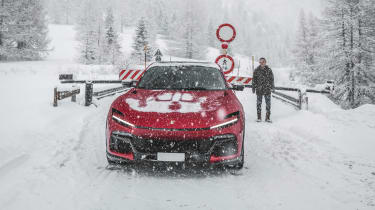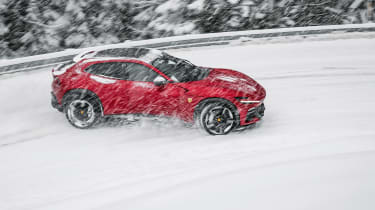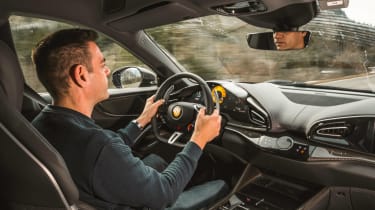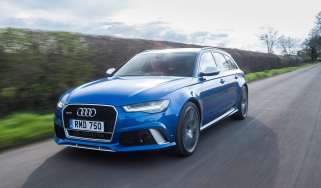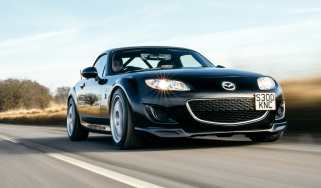New 2023 Ferrari Purosangue review – there's no SUV quite like it
Does Maranello’s first SUV live up to its ‘authentic Ferrari four‑door sports car’ billing? Here’s where we find out
The brilliance of the Ferrari PR department’s dastardly planning only hits me days later. Like a good murder mystery, a series of disparate events coalesce into a perfect whole so seamlessly it seems improbable it could have ever been planned. The plot starts immediately upon landing. The hire car isn’t fitted with winter tyres. Hmmmm. The gorgeous launch venue is high up in the Dolomites. Could be a challenge. Incredibly, our research suggests that despite the location we’ll actually be based many miles from truly great roads. The sort we can’t help but seek out even if it means a much longer day. Ferrari knows that. They know everything.
Pretend phone calls are made to ‘sort the hire car tyres’ to no avail. Apologies are offered that the local roads aren’t that great. They throw us further off the scent with strange demands to ‘not use the boot for photography equipment as the tripods always damage them’. We are quietly irate. Busy, narrow roads. Hire car that will falter as the temperature drops. What’s going on? Ferrari has given us two whole days with the Purosangue, but at the same time seems to be undermining our opportunity to explore and enjoy it.
What to do? There’s only one option. Plot a course several hours from base. The forecast is good. For us, not the skiers – it’s been a strange season with very little snow. At least that’s one variable under control. Maybe everything will be fine, we all agree. Only half believing it.
More reviews
Photographer David Shepherd is struggling to locate the accelerator in the Jeep Renegade hire car so I push on ahead in the Purosangue. The road rushes down the mountain, narrow and unpredictable, before we hit the valley floor and tackle fast, flowing sections weaving in the shadows of the vast mountain range before merging into quiet autostrada. Finally we break away from the main routes and head back up into the clouds.
We ditch the Jeep as the snow starts to fall thick and heavy. The forecast was wrong. We use the precious boot. There’s no choice. Now we’re three-up. The Purosangue is brimmed with people, bags and a quiet sense of despair as the imposing Ferrari arrows past dawdling 4x4 Pandas and gives way to snowploughs zig-zagging up and down in a desperate and doomed attempt to keep the roads open. Eventually, inevitably, we can continue no longer. The Purosangue is unbowed, but the road is closed. A plough driver warns us to get off the mountain. Frustration overflows. We may even take the Ferrari PR's names in vain. Just once. Or twice.
The short version of this tale is that we’ve just driven for several hours with equipment crammed everywhere, through rain, fog and finally relentless snow that has seen cars abandoned and many others turn back. It could be some sort of National Lampoon’s Vacation revival. You know, a hapless family on some sort of skiing holida… aaaaaahhhh. You see? You see what they did? Before we’ve taken a single photograph of the new Purosangue, the PR team has leaked its very purpose deep into our brains. It’s the Ferrari for doing things that Ferraris can’t do. I’ve just witnessed it as if by accident. I feel violated. But impressed.
The Purosangue courts language like this, doesn’t it? A violation of all that’s right and holy. A sell-out. An abomination. A cynical ploy to alleviate huge sums of money from loyal customers. Ferrari doesn’t care. They’ll point to the fact that despite costing £313,220, the Purosangue is already sold out for the next two years. People have demanded this car, they’ll say. Perhaps some have. But the cynic might counter that the eye-watering list price is a small pill to swallow if it guarantees your allocation of the next hardcore 296 derivative or, better yet, the next Ferrari hypercar. It seems madness to suggest people would pay getting on for £400,000 for a sensibly specced Purosangue without actually deeply desiring it. But that’s the world in which we live.
The truth is probably neither as depressing as that scenario sounds nor as joyously simple as Ferrari’s version of events. Some will ache to own it. Others will think of it as a means to a much more exciting end. However, one thing is very clear. No matter the motivation, no matter the compromises nor the imagined incompatibility of Ferrari’s values and this SUV/crossover/four-door physical form, the team behind it have thrown themselves at the task with unbridled passion and a determination to create something truly compelling to drive. So, I guess we should just treat it as a car and see if it’s any good.
The controversy surrounding Purosangue does not extend to its engine. One ingredient that is indisputably fit for any Ferrari. The F140IA 6.5-litre V12 produces 715bhp at 7750rpm, 528lb ft at 6250rpm and can rev to 8250rpm. It sits behind the front axle and drives an eight-speed dual-clutch transaxle very similar to the one fitted in the 296 GTB, plus a crank-driven PTU (power transfer unit) for the front wheels. The PTU is a two-speed unit, plus reverse, and features parallel wet clutches to send drive to the front wheels; the individual control also allows torque vectoring. The four-wheel-drive system is operational from 1st to 4th gears, but from 5th to 8th the Purosangue is purely rear-driven.
Performance is supercar-spec: 0-62mph in 3.3 seconds and a top speed of ‘over 193mph’. Less Ferrari-sounding is the weight figure. The Purosangue uses a new aluminium chassis with high-strength steel integrated for crash safety and features a carbon roof as standard. Despite its increase in size over a GTC4 Lusso chassis, weight is reduced by 4 per cent whilst torsional rigidity is up 30 per cent and flexural stiffness increases by 25 per cent. Impressive numbers, but the net result is still a Ferrari that weighs considerably over 2 tons. Bone dry and with lightweight options fitted, the Purosangue is 2033kg. By comparison, Lamborghini claims 2150kg for the Urus Performante measured to the DIN standard, which includes all fluids necessary for operation plus a 90 per cent fuel load. However, that front-mid layout does offer huge benefits and the Purosangue has a much more desirable weight distribution – 49:51 front to rear versus 58:42 for the Lamborghini.
The Purosangue eats-up long journeys beautifully and everything feels oddly familiar if you’ve been lucky enough to drive a modern front-engined Ferrari, but also slightly out of whack. There’s the same wonderful feeling of having a vast and silkily powerful engine stretching out ahead of you and, rather incredibly, the sense that you’re sitting way back in the chassis. I know for sure that there’s plenty more car behind me, but the impression of being right out over the rear axle is strong. Similarly, although the seating position is higher than that of a Lusso, this car doesn’t convey the sheer sense of scale of, say, an Aston Martin DBX707. It’s exaggerated GT rather than imperious SUV.
The V12 is imperious, of course. The Purosangue’s richly complex engine note is subdued at cruising speeds but ever present and it suffuses quality throughout the entire experience. The interior oozes quality, too. The slightly nauseating, overly flashy colour palette of the 296 GTB’s screens and controls have been calmed considerably. The design is elegant and beautifully executed. The Purosangue feels expensive. And bespoke. That’s the key message you get from this four-door Ferrari in those first few minutes. It’s clearly not based on a more prosaic platform that’s later been endowed with superpowers. The natural responses of the Purosangue are lean and communicated with precision. The light, wonderfully clean steering feel and the way this big car wants to rotate around a point directly beneath the driver’s seat is new for a car of this scale and the performance feels natural rather than contrived. This is obviously not a car that’s going to batter the road into submission. The Purosangue flows.
As ever with a new Ferrari there are dozens of systems working in unison to create this sense of natural athleticism and cohesion. We’ve covered the 4RM-S Evo four-wheel-drive system, but there’s also the rear E-Diff, Side Slip Control 8.0, ABS Evo, Grip Estimation 2.0 (which works with SSC 8.0 to estimate tyre grip more accurately by taking load information from the electric power steering) and the independent four-wheel-steering system first seen on the 812 Competizione.
The Purosangue goes still further with the debut of a completely new suspension system called Ferrari Active Suspension Technology. Developed in conjunction with Multimatic, each damper has its own electric motor driving gears connected to a ball screw that can apply force to speed or slow the piston within the damper. This is great for ride quality, as you can speed up the compression phase over, say, a large speed bump, but the electric motors can also create torque to counter body roll, pitch and dive. Such is its power that Ferrari has eliminated the need for anti-roll bars and could actually make the Purosangue lean into an apex if it so desired. Instead, the active suspension is programmed to ensure control but also natural, predictable responses. Ferrari can also manage the roll stiffness in different phases of a corner. The dampers have their own cooling system and are powered by a battery pack located beneath the driver’s seat.
The manettino features Ice, Wet and Comfort modes and a press of the dual-function rotary switch allows you to separately select between soft or mid-level damping. In the final two positions – Sport and ESC Off – you can cycle between soft, mid and hard for the dampers. In Comfort the Purosangue is wonderfully supple. I heard a couple of grumbles on the launch about the ride quality but I thought it was beautifully judged and I’d take the decisive feel of this system over a car with air springs every time. In fact, I suspect most people would happily live in Sport mode with the dampers set to their mid level and feel very happy indeed.
On deep snow the Purosangue is, of course, a hoot. So much so that I begin to wonder if the front wheels are driven at all. Just a hint of throttle and the rear swings around and the way you can play with the balance so smoothly feels entirely natural. Not a huge consideration for everyday use but a hint of what might be to come if we find some dry tarmac. The eight-speed DCT is excellent: smooth and fast but ultimately lacking the phenomenally crisp, instantaneous feel of an 812 Superfast’s ’box. It’s like they’ve dialled the aggression back and cushioned the action. Even the four-wheel steering, which sounds so contrived in theory, works unobtrusively. The Purosangue reacts like a smaller, lighter car yet feels composed and easy-going. I wish the V12 was a little more vocal at low speeds, but when the noise does arrive under full throttle it’s truly, deeply inspirational. A popping, farting super-SUV from anybody else could never match it.
It’s day two before we find that elusive empty road with snow laying either side but a clear surface. The picture is skewed slightly by winter tyres but there’s no disguising the Purosangue’s agility nor its body control. I’m pleased to say there’s still some roll, a real sense of a supple car breathing with the road surface, and even with the dampers set to hard the Purosangue doesn’t feel board stiff and uncommunicative. You can feel and use the weight transfer without it ever getting out of control. The steering is fast, perhaps a little faster than you’d expect, but it isn’t nervous and matches the alert chassis really nicely. The rear steer? Well, with higher forces it is more apparent. As soon as you turn towards an apex the rear seems to create a yaw moment, then holds it as you unravel the rest of the corner. It’s slightly artificial in feel at times but certainly creates an exciting, interactive balance. A kind of super-sized Mitsubishi Evo. In ESC Off mode the Purosangue goes further still and slides well enough to even make an M3 Touring blush. It’s surreal but highly amusing.
One of the really nice things about the Purosangue is how it doesn’t feel one-dimensional. It hasn’t ploughed a narrow furrow to be The Fastest SUV in the World (a favourite line in many press releases from other manufacturers). It doesn’t feel track-optimised at the expense of GT credentials but it can still get down and dirty if you really fancy it. And in the way it steers, in the lovely fluid balance and with the theatre created by that mighty V12, it is unmistakably a Ferrari. Quite an achievement. Dynamically this car is on the money.
Yet I still find myself having doubts about the Purosangue. The haptic UI is much, much better but it’s still, in truth, a massive inconvenience. Using Apple CarPlay on the move is almost impossible, for example. The central climate-control screen, housed within a rotary controller, looks cool but the reality is it takes a press, a couple of swipes, a prod and then a turn to get the heated seats to the desired setting. Which is patently absurd and a huge distraction from the road. In a car like a 296 GTB details like this might be annoying but not a fundamental flaw. By its very nature a mid-engined supercar is not an everyday proposition. The Purosangue can’t get away with this stuff so easily.
There’s more, too. Compared with a DBX707 for example, the Purosangue is hopelessly impractical. I love the rear-hinged ‘welcome doors’ and they provide superb access to the rear seats. But there’s only two of them. Luggage space is also pretty compromised and so the Purosangue couldn’t be a replacement to something like a Range Rover or even an Audi RS6 for most families. So it falls into a strange space – not quite practical enough to be used as a family car for many but too practical, too big and too heavy to be a true Ferrari sports car. It’s a striking-looking thing, no question, but even the aesthetic doesn’t radiate the pure glamour of a front-engined Ferrari GT. The design feels of the moment rather than timelessly elegant.
Add all of this up and it’s hard to fall completely in love with the Purosangue. Up to now the simple act of driving a Ferrari has transported you to a better version of the world. Sunnier, more carefree, where all roads lead to a fantasy home in the south of France. This new sort of Ferrari bounds through our world with stunning ability and at times is hugely entertaining, but the experience is rooted in reality. Elevated but never life-changing. And £313,220 is a very high price to pay to never truly escape.
Ferrari Purosangue specs
| Engine | V12, 6496cc |
| Power | 715bhp @ 7750rpm |
| Torque | 528lb ft @ 6250rpm |
| Weight | 2033kg (dry) (357bhp/ton) |
| 0-62mph | 3.3sec |
| Top speed | 193mph+ |
| Basic price | £313,220 |
> Ferrari 296 GTB 2023 review – fewer cylinders, greater thrills


